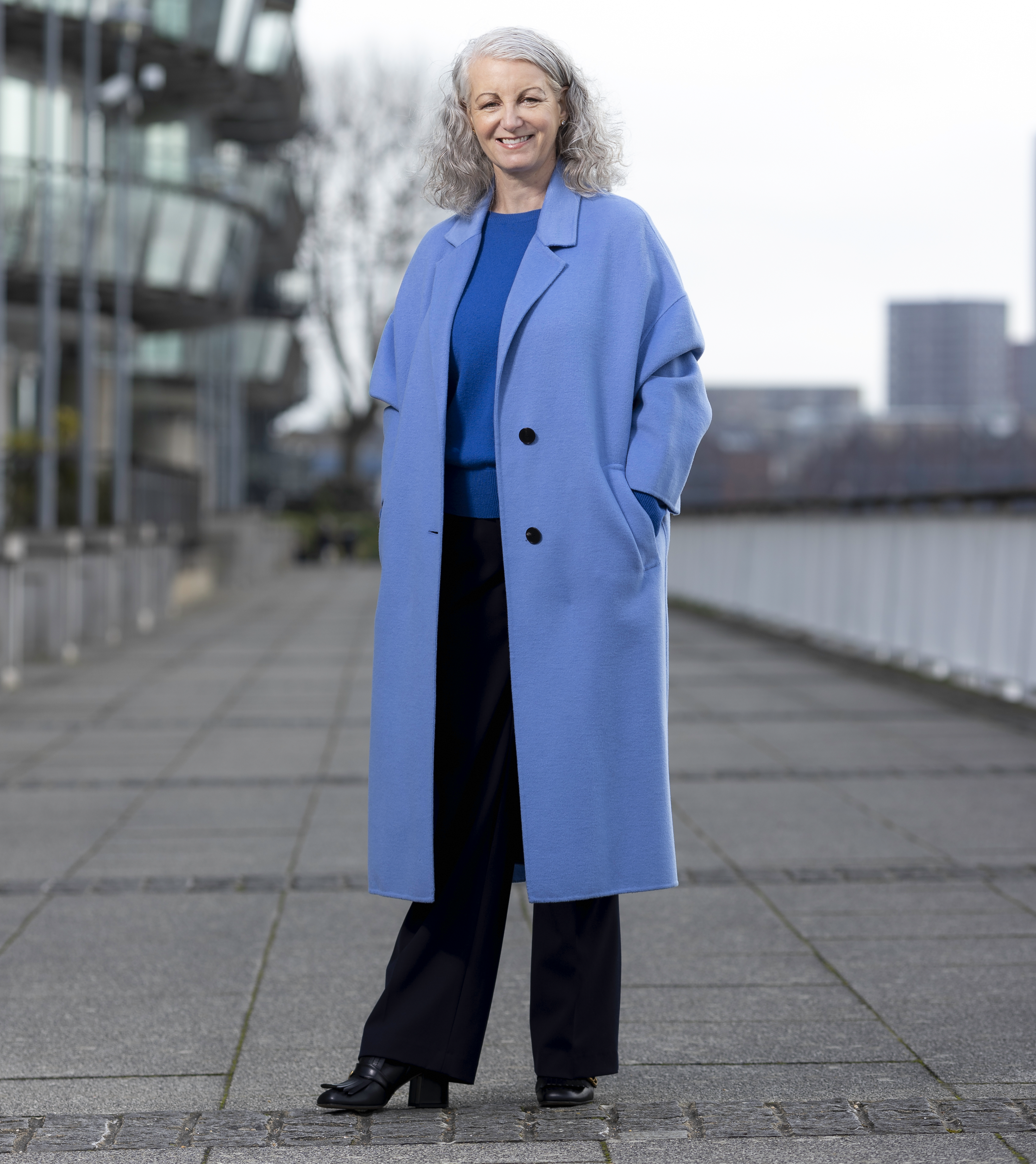Colleen, tell us about your early life and how you found the path to a career in HR.
Well today, I’d like to think that my colleagues would describe me as driven, strategic and action-oriented. But it wasn’t always like that and during my twenties, I moved from job to job every couple of years, without much of a career plan. Then it came to a point when working as an office manager, in a small privately-owned research consultancy, I decided I needed to figure out what I wanted to do long-term, what I was passionate about and what would keep me engaged. So I literally wrote a list of what I most liked and disliked about my current role, what I thought I was good and not so good at and I worked out that it was the people aspects that I was really passionate about and energised me. I carried out further research and decided that the best thing for me would be to go back to education and gain some business school qualifications, to set myself up for a career in HR. I really wasn’t relishing the prospect of studying again – I’m not a natural studier – so I dipped my toe in tentatively, starting with a foundation course, supported by my employer, which I was extremely grateful for. To my surprise, I exceeded my expectations, gaining top marks and then decided that perhaps I could go on to complete the two-year CIPD qualification. I found the subject matter fascinating and I was particularly interested in the dynamic of the employer/employee relationship. After fulfilling my promise to the firm of staying a year after I finished my studies, new opportunities began to present themselves and I was thrilled to be accepted in a more prominent role, at an American IT consultancy. However, it was during the dot.com boom when company mergers were as frequent as they were unexpected and just as I was settling in, my role disappeared, literally overnight, due to an M&A. It was a shock, but also a valuable lesson for any HR person, being on the other side of a redundancy situation and understanding first-hand the impact of it. Like anyone, I had bills to pay, so I had to move quickly and I decided the quickest way back to work was to temp and found myself standing in Canary Wharf, craning my neck skyward at the enormous Morgan Stanley building.
Starting at Morgan Stanley in a temporary admin role in the Chairman’s office, I took every opportunity that came my way, until the COO suggested that it was time for me to have a permanent role. I was handed a fantastic opportunity, the much-coveted “blank sheet of paper”, to build an early talent programme, to create the leaders of the future. I remember asking about my budget and was told to spend whatever I needed to, so we set about building a small team of brilliant people and worked hard on the programme design, with the emphasis on it being compelling, inclusive, and fun. If I can claim any legacy, we created a programme built around the “Life of a Trade”, which actually became a blueprint for the organisation worldwide, supplying and supporting graduates through their intensive entrance into the banking world. That team is still one of the best I’ve ever worked with and I’m immensely proud of what we managed to achieve together. I couldn’t have hoped for a better experience, but it was tough too, as expectations were very high and you were only as good as your last project. I witnessed the value of investing in people and the importance of genuinely diverse teams.
One of my passions in life is horses and I remember having a conversation with my mum, when I was a teenager, about what I wanted to do for a job and I said, with passion and conviction: “I want to work with horses”. Instantly, my mum retorted, “that’s not a job… it’s a hobby!” University certainly hadn’t been an option for me, but during my time at Morgan Stanley, listening to all the stories from the new graduates about their gap years, I felt that perhaps I’d missed out and maybe I should think about doing some travelling myself. This also coincided with a dear friend who has passed, who was one of my first friends at Morgan Stanley. I remember thinking if I died tomorrow, would I be happy with my lot? The answer was clearly no! So you could say the grads and my friend inspired me to go out and see a bit of the world. I’d put some money aside and I thought that if I didn’t act now, I never would. So I set out to Botswana, to do a horseback safari in the Okavango Delta. I then went to Montana and learned to be a cowgirl and that led to working with horses in Andalusia… there was definitely a horse theme! Dur ing my final week in Andalusia, I met some women who introduced me to a ranch owner in California and this led me to work on a ranch with 60 horses and on Monday mornings, I still sometimes wish I was riding on Ten Mile Beach in Fort Bragg, with not a soul around.
While the whole experience was incredible, I started thinking about my professional career again and how I had missed the intellectual challenge of my corporate life. So, I decided to try and combine the two, whereby the winter months, I would work in banks in London and the summers would be spent in California, working on the ranch. Sadly, on one of my trips back for the winter, my younger brother passed away. We were very close and as both my parents were long gone, I felt that I really needed to be around people who knew me and who could support me and I decided not to go back to California. At the time, I was working on various HR projects on an interim basis in the Investment Banking/Financial Services space, but the accrual of my skillset in HR had built up and I confidently applied for a permanent senior HR role and was successful in becoming HR Director of a technology company, which had just acquired an electronic trading company and were looking to take it global.
It must have been a tough decision to give up on your passion.
I think my childhood – which had been challenging at times – made me realise I wanted something different from my parents’ lives. My career up to that point had also taught me how quickly things can change. The moment I became an HR Director was a pivotal point of my life. I recalled thinking back to a conversation I’d had in a bar years earlier, with my fellow CIPD students, talking about whether we’d ever ‘make it’ as HR Directors? Also, I had come to a point where I realised it wasn’t really about me anymore, it was about my teams and how I could develop them. When you become a leader, your focus transitions away from personal ambition alone and focuses on lifting others up and for me, it brought greater satisfaction to see people develop. It’s that point where the individual becomes a team player.
Tell us about your move to Schneider Electric.
After a full-on, hectic five years at Colt Technology Services/Marketprizm, one of the female executives I had supported had become CEO of Schneider Electric UK&I. We’d kept in touch and then, one day out of the blue, she called me. I was open to working with her again, we made a great team, so I went to meet some of the Executive team and was impressed. I connected with their values and what they were trying to do around sustainability and their people story and vision. Schneider’s business and every service we provide, is focused on sustainability, providing safe, reliable access to energy, saving energy, transforming, electrifying and decarbonising energy. It is multifaceted, covering engineering, manufacturing, digitisation and process automation. What they were trying to do was impressive, new to me and I was interested in finding out how I could help. Schneider uses its own technology to set the example on reaching Net Zero targets and all 17 of the UN’s Sustainable Development Goals. It has long been a champion of a more fair and equal society seeing access to energy and a better life as a basic human right and it has been involved in global initiatives like HeForShe, since its beginning. At first, I was a bit daunted by its size; 137,000 people – twice the headcount of Morgan Stanley – in over 100 countries. I had never had the ambition to join such a vast organisation, but it was really compelling and I was curious to see what I could achieve.
I'm always fascinated by HR on a vast scale. How do you set out your stall and roll out initiatives in a company of this size?
In the best of worlds, you understand the organisation, agree on the objectives and plan the schedule. That’s all well and good in an environment that doesn’t change, but Schneider has grown quickly through strategic acquisitions made across the globe and when that happens, you have to remain agile and move rapidly in HR, to ensure the right, mainstream company culture propagates. In the UK and Ireland, we’re just over 4,000 people across 39 various sites, including ten manufacturing and two logistics sites. We are a highly matrixed organisation with some UK-and-Ireland based people reporting to people in other territories across the globe, so to some degree, there are micro-cultures united by similar values, mission and vision. While diversity in all its forms is important, it must be empowered and routed through effective company structures and clear reporting lines. We spend a lot of time aligning the organisation and understanding t he direction we are heading in. The aim is to have an umbrella strategy and shared values, that connect everything together, but also allow for a workable level of autonomy and independence. Trying to apply a universal approach is a big mistake in such a complex organisation as ours. Like most companies, we’ve adapted to new ways of working, accelerated by the pandemic. I believe this has put a light on the importance of treating people fairly and equally and that everyone should be an individual and have the flexibility to discuss what works best in each situation.
The pandemic had certainly raised many issues, the people-first mantra being one of many.
Yes, but the people-first mindset needs a caveat, we must accept that unless a business has strong foundations and healthy commercial imperatives, jobs will not be available. HR does not drive the commercial agenda, it facilitates, enables and supports it and everything we discuss, plan and implement is based on supporting and adding value and, importantly, making it more efficient and capable of optimising the commercial opportunities, both in terms of cost and resource. However, there is also a lot of ambiguity that must be overcome in HR. We are problem solvers. As we support through the pandemic and look beyond, the workplace landscape has changed indefinitely. It will redefine the relationship with work which will require some redefinition from HR. Remote working has raised employee autonomy, self-responsibility and the necessity for mutual trust and the mindset of presenteeism doesn’t exist anymore. Then there is the whole digitalisation story – accelerated by the pandemic – we see that digital redefines what we do and how we do it. This is a significant transition that we need to be fully prepared for.
There are fundamental questions to answer, but it must be an exciting time to be involved in HR, as you could almost tear up the rule book and start again.
Yes, there are big changes and fundamental questions to both ask and find answers to; what does work and the workplace itself represent? What is the psychological and physical contract as we go forward? Only time will tell how it will all play out. If in 2019, my boss had said, “Right, Colleen, we need to move three thousand people to work from home next week,” I would have thought he’d lost his mind! But out of this dreadful time, we have an opportunity that must not be squandered, to look at the fundamentals of work and re-evaluate what is possible and come out stronger. It is amazing what you can achieve when you all pull in the same direction and yes, we did transition three thousand people to work from home in a week. The new mantra, “really listening to your employees”, is mind-boggling… as if this is a new thing? I think the emphasis is on the “really” and locks into that notable change in leadership values and skills. The draconian, command and-control leadership of yore is rapidly being replaced. Leaders are no longer afraid to show that they need help and don’t have all the answers, but together “we” can find them. That’s where the most remarkable change lies and it will definitely resonate in this next complex transitionary stage of events in the pandemic. We need to understand that we will never go back to how it was before, there’s no point deluding ourselves on that. In terms of a general practical and sustainable working framework, the hybrid model makes sense, but such change cannot be left to its own devices. There will be a need for a change in mindsets, supporting policies and coordinated training. Greater employee autonomy and trust are essential, and we will be recruiting for different skills and capabilities with resilience and self-motivation high on the agenda. We support equality and inclusion because diversity of thought is an essential requirement for the unpredictable road ahead. As with everything, it’s easier said than done. In our business, we have so many different markets and countless types of jobs. Inevitably some of our employees simply cannot work from home in the same way as some of their colleagues. They must be accommodated in an agile framework that makes sense for their type of work to ensure that everyone is treated equally. What is so pivotal to success is the relationship between employees and managers and people and their colleagues. As the workplace flattens, silos are filled in and people are increasingly working across the borders and boundaries that once compartmentalised organisations. Knowledge share, resilience and agility will be the main drivers now, as we are moving to a more deliverables-performance type model.
What do you think you've learned from this challenging and testing time, and are you optimistic for the future?
For myself and my HR team, it has been a gruelling year. For a huge part of last year, we were working around the clock, six, sometimes seven days a week and, for a time, it was only COVID-related activity. I’m personally a “glass half full” person, so yes, I’m always optimistic for the future and what it may hold. As a business, we moved at pace to ensure customers’ needs were fulfilled and business continuity and flexibility were in place. Especially considering that Schneider’s been powering and maintaining the nation’s most critical assets 24/7, such as electrical grids, water networks, hospitals, and data centres as the pandemic set in. The KPIs and the targets didn’t go away. But the health, safety and wellbeing of our employees was also our number one priority. It became our primary focus at the pandemic’s onset in the broadest sense; physical, mental, and emotional wellbeing and, without doubt, this testing time has shone a light on the many different pressures people face in their lives. We must support them if we expect reliable, sustainable performance and retention. As leaders, we need to be mindful of the stress that people are under and not be complacent. Everyone’s circumstances are different and we have to think much more on an individual level. Support needs to be available and easy to access and that will require an increase in self-service, but it must be combined with human empathy and understanding. In terms of what has been learned from this time, I would say don’t underestimate people… we have seen many do some incredible things during this time. If anything, values, empathy and the mindset for compassion have shone through, meaning that the importance of people and HR has ascended. The pandemic challenges have not dimmed our commitment to ensuring our organisation is a diverse, inclusive, and supportive place to work. We have continued to drive forward with initiatives to attract and recruit talent from a diverse range of backgrounds. We have invested in early-stage career recruitment and looked to hire from places we may not have looked before. We have assessed candidates for their potential – not just their existing skills – and hired more females than males to diversify our workforce. There is an excellent opportunity for this generation and those coming into the world of work, to make radical improvements, to shape the future.
What do you hope to achieve that when you look back at your career, you will be most proud of?
As a senior leader from an untypical background, my hope is that there must be a level-playing field for anyone with an ambition that is willing to work hard. It must not matter what their demographic is, what university they may or may not have attended, their colour, their gender or sexuality. It doesn’t make sense when organisations still fail to represent the society we live in or their diverse customers. We have a real opportunity in front of us to finally put this right. None of us have a crystal ball, we never saw the pandemic coming and you never know what is around the corner. Still, one thing is certain, if a business continues with a rigid mindset and inflexibility, it will not survive. The significant learning for me is that we have to listen and understand with empathy and pragmatism. To coin that cliché of our time, I think we can build back better. Finally and importantly, I would like to dedicate this interview to my mentor/coach/D+ … Peter Cunningham, whom I met through the CIPD community board almost ten years ago. Without his guidance, honesty, patience and caring, I would not be the leader I hope I am today.












